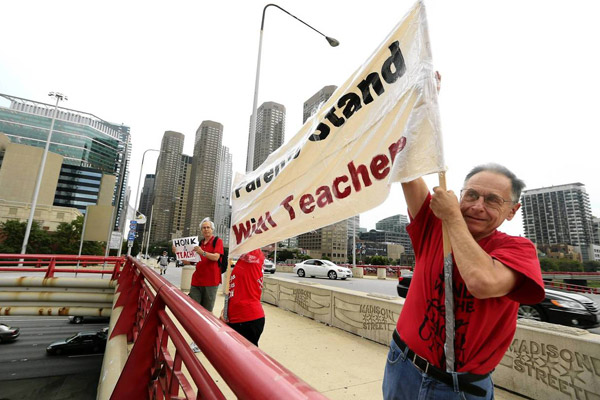
Phil Kadner has a column in the Southtown Star about the Chicago teachers' strike that expresses one basis for opposition that I've seen a lot—not just that there's a great deal of anti-union sentiment generally, but that it's deeply unpopular to be clamoring for a raise in the midst of a recession, at a time when very few private-sector employees are getting them. Granted, raises don't seem to be a major block to the negotiations, but it appears they're a sore point in the court of public opinion:
Although representatives of the Chicago Teachers Union say this is not about money (a 16 percent pay increase over four years), I think it’s going to seem that way to an overwhelming number of taxpayers.
I’m talking about people who haven’t had a wage increase in three or four years.
[snip]
They see teachers making a good wage (an average of between $71,000 and $78,000, depending on whose figures you believe), with health insurance, pensions and job security, who don’t seem to understand that their neighbors lost all of that long ago.
FWIW, I make a lot less than that, so I can understand the politics behind it. But even that raises a tough question: should taxpayers resent the union for asking for more when salaries have flatlined? Or should they consider how organizing has kept public-teacher salaries steady—accounting for inflation—over the years?
I don't have an answer for that, but I am interested in CPS salaries in their context. Is it a good wage? In a controversial post, Dylan Matthews points out that Chicago public-school teachers make more than the average working stiff and big-city teacher:
Chicago school teachers make a median salary of $71,017. That’s a whole lot more than the city’s median household income (which can include multiple salaries for households with more than one earner) of $46,877, and greater still than its median per capita income of $27,148. But how does it compare to other urban school districts?
Answer: they do pretty well by comparison to other big-city districts, but not necessarily in comparison to, say, Illinois suburban school districts. But how do they do compared to Chicagoans like themselves, with similar educational attainment?
The American Community Survey (5-year estimates) gives us the following median earnings for Cook County:
* Women with bachelor's degrees: $44,084
* Men with bachelor's degrees: $59,895
* Women with graduate or professional degrees: $56,110
* Men with graduate or professional degrees: $79,556
Education counts: a woman with a bachelor's stands a good chance of making a salary comparable to the city's median household income. A man with a graduate or professional degree, almost twice that.
Now, CPS teachers (PDF).
* Lane I (bachelor's degree), step one (first year) teachers working a 38.6-week position make $50,577 ($47,268 without the pension pickup). Lane I maxes out at step 16, $85,135 ($79,566).
* Lane II (master's), step one: $54,080 ($50,542 without pension pickup). Step 16: $87,743 ($82,937)
* Lane VI (doctorate), step one: $61,087 ($57,091 without pension pickup). Step 16: $95,957 ($89,680).
There are other lanes in between for graduate credit, but you get the idea.
So:
* If you're a female teacher with a bachelor's, you will start at more than the median income for women like you in Cook County. If you have a PhD you will as well; if you have a master's, typical for public school teachers, you won't necessarily (it's hard to tell since the ACS conflates postgrad degrees).
* If you're a male, you'll have to work for CPS awhile to get above the median for guys with your educational attainment: five years if you have a bachelor's, 11 if you have a master's, eight if you have a Ph.D.
Is it a good salary? Quite. Does it compare well to other public-school teachers' salaries? Definitely by big-city standards, not necessarily by state suburban standards. How does it compare to people with similar educations? It's in the ballpark, but favorable if you're a woman, not so much if you're a man.
Photograph: Chicago Tribune



